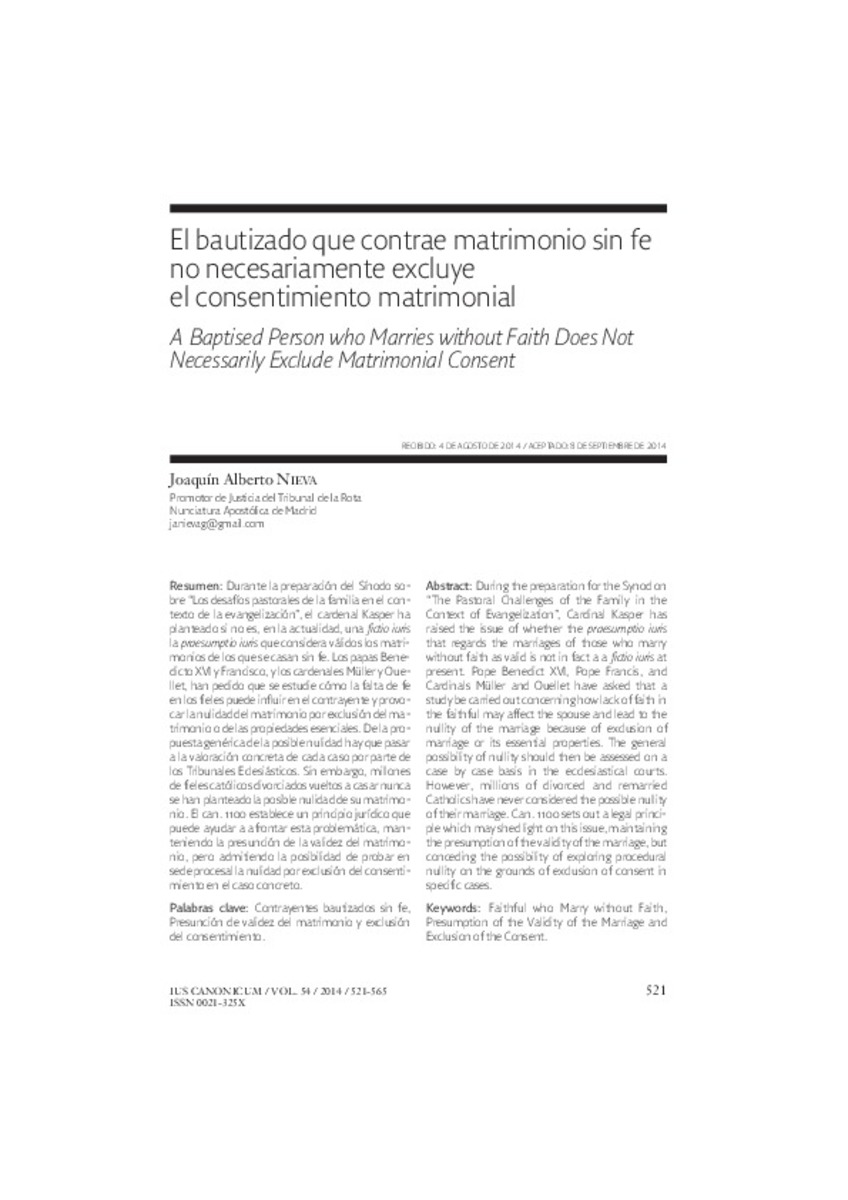Full metadata record
| DC Field | Value | Language |
|---|---|---|
| dc.creator | Nieva, J. A. (Joaquín Alberto) | - |
| dc.date.accessioned | 2016-11-10T12:23:16Z | - |
| dc.date.available | 2016-11-10T12:23:16Z | - |
| dc.date.issued | 2014 | - |
| dc.identifier.citation | Nieva, J. A. (2014). El bautizado que contrae matrimonio sin fe no necesariamente excluye el consentimiento matrimonial. Ius Canonicum 54, 108, pp. 521-565 | es_ES |
| dc.identifier.issn | 0021-325X | - |
| dc.identifier.uri | https://hdl.handle.net/10171/42195 | - |
| dc.description.abstract | Durante la preparación del Sínodo sobre “Los desafíos pastorales de la familia en el contexto de la evangelización”, el cardenal Kasper ha planteado si no es, en la actualidad, una fictio iuris la praesumptio iuris que considera válidos los matrimonios de los que se casan sin fe. Los papas Benedicto XVI y Francisco, y los cardenales Müller y Ouellet, han pedido que se estudie cómo la falta de fe en los fieles puede influir en el contrayente y provocar la nulidad del matrimonio por exclusión del matrimonio o de las propiedades esenciales. De la propuesta genérica de la posible nulidad hay que pasar a la valoración concreta de cada caso por parte de los Tribunales Eclesiásticos. Sin embargo, millones de fieles católicos divorciados vueltos a casar nunca se han planteado la posible nulidad de su matrimonio. El can. 1100 establece un principio jurídico que puede ayudar a afrontar esta problemática, manteniendo la presunción de la validez del matrimonio, pero admitiendo la posibilidad de probar en sede procesal la nulidad por exclusión del consentimiento en el caso concreto. | es_ES |
| dc.description.sponsorship | During the preparation for the Synod on “The Pastoral Challenges of the Family in the Context of Evangelization”, Cardinal Kasper has raised the issue of whether the praesumptio iuris that regards the marriages of those who marry without faith as valid is not in fact a a fictio iuris at present. Pope Benedict XVI, Pope Francis, and Cardinals Müller and Ouellet have asked that a study be carried out concerning how lack of faith in the faithful may affect the spouse and lead to the nullity of the marriage because of exclusion of marriage or its essential properties. The general possibility of nullity should then be assessed on a case by case basis in the ecclesiastical courts. However, millions of divorced and remarried Catholics have never considered the possible nullity of their marriage. Can. 1100 sets out a legal principle which may shed light on this issue, maintaining the presumption of the validity of the marriage, but conceding the possibility of exploring procedural nullity on the grounds of exclusion of consent in specific cases. | es_ES |
| dc.language.iso | spa | es_ES |
| dc.publisher | Servicio de Publicaciones de la Universidad de Navarra | es_ES |
| dc.rights | info:eu-repo/semantics/openAccess | es_ES |
| dc.subject | Presunción de validez del matrimonio y exclusión del consentimiento | es_ES |
| dc.subject | Contrayentes bautizados sin fe | es_ES |
| dc.title | El bautizado que contrae matrimonio sin fe no necesariamente excluye el consentimiento matrimonial | es_ES |
| dc.title.alternative | A Baptised Person who Marries without Faith Does Not Necessarily Exclude Matrimonial Consent | es_ES |
| dc.type | info:eu-repo/semantics/article | es_ES |
| dc.identifier.doi | 10.15581/016.54.677 | es_ES |
Files in This Item:
Statistics and impact
Items in Dadun are protected by copyright, with all rights reserved, unless otherwise indicated.






